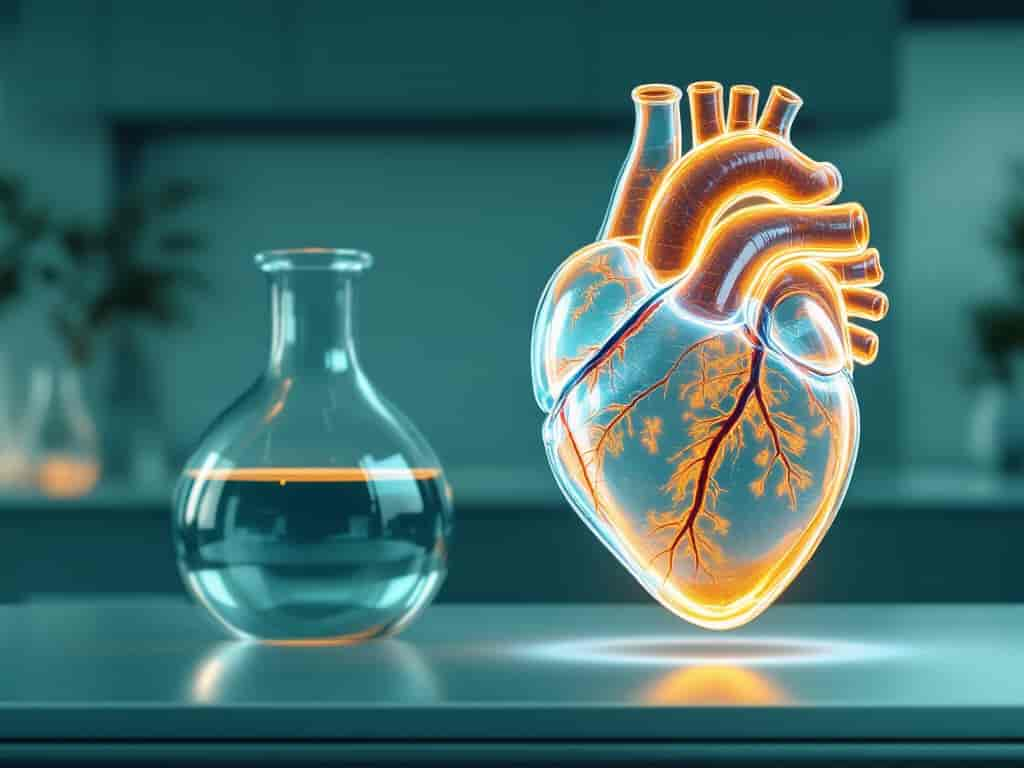Cholesterol Explained: Good vs. Bad
Ellie Moore

Photo: Cholesterol Explained: Good vs. Bad
Cholesterol Explained: Good vs. Bad
When it comes to health and nutrition, cholesterol is one of the most misunderstood topics. You've likely heard terms like "good cholesterol" and "bad cholesterol," but what do they really mean? Let’s break it down in simple, digestible terms and uncover the role cholesterol plays in your body, its impact on your health, and how you can maintain a healthy balance.
What is Cholesterol?
Cholesterol is a waxy, fat-like substance found in every cell of your body. It plays a vital role in building cell membranes, producing hormones, and helping your body make vitamin D. However, too much or too little cholesterol can lead to health complications.
Your body naturally produces cholesterol in the liver, but it’s also absorbed from the foods you eat. Understanding the types of cholesterol and their effects is key to managing your overall health.
Types of Cholesterol: Good vs. Bad
Not all cholesterol is created equal. There are two main types:
1. Low-Density Lipoprotein (LDL): The Bad Cholesterol
LDL cholesterol is often dubbed the "bad cholesterol" because high levels can lead to plaque buildup in your arteries, increasing your risk of heart disease and stroke.
Effects of High LDL Levels:
- Atherosclerosis: Hardening and narrowing of arteries.
- Heart Disease: Restricted blood flow can result in heart attacks.
- Stroke: Blockages in blood vessels leading to the brain.
Foods high in saturated and trans fats, such as fried foods, processed meats, and full-fat dairy, can raise LDL levels significantly.
2. High-Density Lipoprotein (HDL): The Good Cholesterol
HDL cholesterol is known as the "good cholesterol" because it helps remove excess cholesterol from your bloodstream, transporting it back to the liver for excretion.
Benefits of High HDL Levels:
- Reduces the risk of heart disease.
- Prevents arterial plaque buildup.
- Improves overall cardiovascular health.
Incorporating heart-healthy foods, such as fatty fish, nuts, seeds, and avocados, can boost HDL levels.
Understanding Triglycerides: The Third Player
While LDL and HDL dominate the conversation, triglycerides play a crucial role in cholesterol management. Triglycerides are a type of fat that provides energy to your body. However, elevated levels can contribute to plaque buildup in your arteries when combined with high LDL or low HDL.
Causes of High Triglycerides:
- Excessive sugar and alcohol intake.
- Obesity and lack of physical activity.
- Uncontrolled diabetes.
How to Maintain a Healthy Cholesterol Balance
A balanced cholesterol profile is essential for heart health. Here are actionable tips to help you achieve and maintain optimal levels:
1. Adopt a Heart-Healthy Diet
Focus on nutrient-dense, cholesterol-lowering foods:
- Oats and Whole Grains: High in soluble fiber, which reduces LDL levels.
- Fatty Fish: Rich in omega-3 fatty acids, promoting HDL levels.
- Nuts and Seeds: Excellent sources of healthy fats and fiber.
- Fruits and Vegetables: Packed with antioxidants that combat oxidative stress.
2. Stay Active
Regular physical activity boosts HDL levels and lowers LDL and triglycerides. Aim for:
- Aerobic Exercise: Walking, jogging, cycling, or swimming for at least 30 minutes a day, five days a week.
- Strength Training: Builds muscle and aids in fat metabolism.
3. Manage Stress
Chronic stress can increase LDL levels and decrease HDL. Practice stress management techniques such as meditation, deep breathing, or yoga.
4. Avoid Smoking and Limit Alcohol
- Smoking: Lowers HDL and damages arterial walls, making it easier for LDL to cause harm.
- Alcohol: While moderate consumption of red wine might increase HDL, excessive drinking raises triglycerides.
5. Regular Checkups
Routine blood tests can help you monitor your cholesterol levels and catch potential issues early.
Real-Life Success Story: Lisa’s Cholesterol Turnaround
Lisa, a 45-year-old teacher, discovered during a routine checkup that her LDL cholesterol was dangerously high at 160 mg/dL, and her HDL was only 35 mg/dL. Her doctor recommended dietary changes, regular exercise, and stress management techniques.
After six months of eating more whole grains, incorporating fish into her diet, and engaging in daily brisk walks, Lisa's LDL dropped to 110 mg/dL, and her HDL rose to 50 mg/dL. Her commitment to lifestyle changes not only improved her cholesterol but also boosted her energy levels and overall health.
Frequently Asked Questions (FAQs)
1. What’s a Healthy Cholesterol Range?
- Total cholesterol: Less than 200 mg/dL
- LDL: Less than 100 mg/dL
- HDL: 60 mg/dL or higher
2. Can I Reduce Cholesterol Without Medication?
Yes! Lifestyle changes like improving your diet, exercising, and reducing stress can significantly lower cholesterol levels.
3. How Often Should I Get My Cholesterol Checked?
Adults over 20 should get their cholesterol checked every 4-6 years, or more often if they have risk factors like obesity or a family history of heart disease.
Call to Action
Understanding the balance between good and bad cholesterol is a crucial step toward better health. By making small but meaningful lifestyle changes, you can protect your heart and live a vibrant life.
Do you have questions about cholesterol or tips that worked for you? Share your thoughts in the comments below, and don’t forget to share this article with your friends and family to spread awareness!
For more insights on heart health and wellness, explore our related articles. Together, let’s take the steps toward a healthier tomorrow.
Finance & Investment
View All
April 1, 2025
The Psychology of Money: Unlock Financial SuccessDiscover how your mindset shapes financial decisions. Learn how to rewire your thinking for lasting financial success. Take control of your money today!
Ellie Moore

April 21, 2025
Wells Fargo Home Financing TipsUnlock online visibility & growth with expert SEO content. Learn to craft high-quality, E-E-A-T content that ranks high and engages your audience.
Ellie Moore

January 18, 2025
Master Competitive Analysis in 5 Simple StepsLearn the 5 essential steps to perform competitive analysis effectively and gain a strategic edge in your industry.
Ellie Moore

January 15, 2025
The Journal of Finance HighlightsElevate your online presence with expert SEO content. Create valuable, user-centric material that ranks high and builds trust with readers and Google.
Ellie Moore

May 9, 2025
Yahoo Finance News and InsightsDominate search in 2025 with expert SEO content. Learn to create valuable, E-E-A-T compliant resources that satisfy users and build authority.
Ellie Moore

November 2, 2025
How to Pay Auto Finance BillsElevate your online presence! Learn to craft expert SEO content that ranks high by focusing on E-E-A-T, user intent, and genuine value. Get your blueprint.
Ellie Moore
Insurance
View AllMake informed choices for your health! Compare plans and find the right coverage to protect your well-being.
Ellie Moore
Understand the differences between HMO, PPO, and EPO health insurance networks. Pick the plan that suits your needs best!
Ellie Moore
Discover how peer-to-peer insurance models operate, offering community-based risk-sharing alternatives.
Ellie Moore
Explore aviation insurance options, from aircraft liability to passenger protection. Secure the skies for your operations!
Ellie Moore
Protect your small business from cyber threats with essential cyber insurance. Learn why it’s critical in today’s digital age.
Ellie Moore
Understand the legal side of insurance with this guide to policy exclusions. Learn what’s not covered and why it matters.
Ellie Moore
Education
View AllDifferentiated instruction helps teachers reach diverse learners. Find out how tailored teaching improves outcomes for every student.
Read MoreStrong school-community partnerships can drive student success. Discover the benefits and strategies for effective collaboration.
Read MoreLearn key strategies for creating inclusive classrooms. Discover how to foster equality, engagement, and a sense of belonging for every student.
Read MoreDiscover how AI-powered personalized learning is reshaping education. Learn how smart tech tailors content to fit individual student needs.
Read MoreMultilingual education promotes diversity and cultural understanding. Learn why it matters and how it benefits students in a globalized world.
Read MoreSocial skills training is key for kids with autism. Learn practical strategies to improve social interaction and communication in children with ASD.
Read MorePopular Post 🔥
View All
1
2
3
4
5
6
7
8
9
10
Health






Automotive
View All
August 27, 2025
Premium Automotive Services For High End Cars
Luxury & exotic cars demand premium care. Discover why specialized services are essential to preserve their performance, stunning aesthetics, and long-term valu...

July 25, 2025
Expert Automotive Advice For Better Car Care
Master smarter car care with expert advice. Prevent costly repairs, enhance safety, and extend your vehicle's life for ultimate longevity and savings.

August 1, 2025
Find A Reliable Automotive Electrician Near Me
Car electrical issues? Discover why a specialist is crucial & how to find a reliable automotive electrician near you for expert vehicle repair.

September 7, 2025
Capital Automotive Services For Every Budget
Don't let car care break the bank! This guide shows how affordable automotive services and smart maintenance keep your vehicle safe and save you money.

July 30, 2025
Automotive AC Service Near Me For Cool Drives
Ensure cool, comfortable drives! This guide covers car AC service, common issues, and finding reliable repair to keep your vehicle's AC running perfectly.

February 15, 2025
Car Auction Guide: Tips for First-Time Bidders
New to car auctions? This guide covers essential tips for first-time bidders, from setting a budget to spotting a great deal. Ready to bid smart?

















